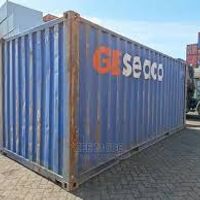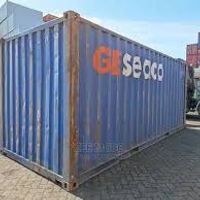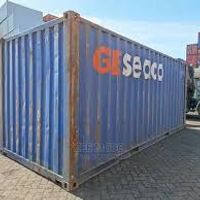Understanding shipping container weights is essential for the safe transport of your cargo. This blog will help you choose the right container size for your shipments and secure budget-friendly deals from vetted suppliers.
Knowing the weight of your container is crucial for safety compliance and effective logistics planning, yet it’s often overlooked. Overweight containers can cause fines, cargo damage, and delays. We’ll delve into how to avoid all of these issues later in the blog.
But first, if you’re looking to expand your fleet hassle-free, Container xChange is the all-in-one container marketplace you’ve been searching for. Connect with 1,700+ trusted suppliers, and choose from 100,000+ containers available in 2,500+ locations globally.
Try our public search below to browse and compare available container offers that fit your budget and requirements right now.
10,333 results found on the platform.
Container prices start from $350/unit.
Currently no match for your search
Change your search criteria or fill out the form below to get notified via email when there is a new match for you on xChange!
-
Pick-up
20DC (Cargo worthy)
37 units available
YOM:
Year of manufacture:
2004
2010
Savannah, GA
per container
Non-negotiable price$
925
-
Pick-up
40HC (Cargo worthy)
4 units available
YOM:
Year of manufacture:
2004
2010
Los Angeles, CA
per container
Non-negotiable price$
1650
-
Pick-up
40HC (Cargo worthy)
7 units available
YOM:
Year of manufacture:
2004
2010
Chicago, IL
per container
Non-negotiable price$
1700
Showing 3 of 10,333 results
Load more()
YOM:
Year of manufacture:
per container
$
How much does an empty shipping container weigh?
On average, an empty 20ft container weighs between 1.8 and 2.2 metric tons (2,300kg or 5,071.5 lbs.).
A 40-foot shipping container weighs between 3.8 and 4.2 metric tons (3,750kg or 8,268.8 lbs.) and an empty 40-foot high cube is between 3.9 and 4.4 metric tons (3,900kg or 8,598 lbs.).
It’s essential to understand the weight of a shipping container if you want to transport goods safely and avoid issues. In the following sections, we’ll cover types of container weights and container dimensions, so that you can make the best decision for your shipments.

3 types of shipping container weights
There are three different types of container weights to keep in mind when planning shipments. Let’s understand them now.
What is tare weight?
The tare weight is the weight of a container when it’s empty. This includes the container itself, as well as the doors, roof, and fixtures. For example, the tare weight of an empty 20ft container is around 2,300kg (5,071.5 lbs). This number is essential for accurately calculating the total weight of a loaded shipping container.
What is container payload (net weight)?
The container payload is the total weight of cargo that can be loaded into an empty shipping container and carried safely. This measurement represents the weight of the actual cargo itself. Every container type and size is designed to carry a specific payload, and this should never be exceeded.
For instance, a 20ft container with a payload capacity of 25,000kg (55,126.9 lbs) can carry approximately 25,000 liters of water or 20,000 bricks. Be sure to limit your cargo weight to the container payload capacity in order to comply with safety standards.
What is gross weight?
Gross weight is a combination of the tare weight and the payload capacity. In other words, gross weight is the total weight of a loaded container. Calculating maximum gross weight is crucial in transportation and logistics, as it helps ensure that containers are fully loaded, and that all regulations are met.
Here’s how to calculate the gross weight:
Maximum gross weight = tare weight + cargo weight
20ft shipping container weight capacity
The weight of a 20’ shipping container is 2,300kg / 5,071.5 lbs, and the dimensions are 5.9m x 2.35m x 2.39m.
The 20ft container is popular due to its compact and lightweight nature. If this size is perfect for your shipments,
40ft container weight capacity
The weight of a 40’ shipping container is 3,750kg / 8,268.8 lbs, and the dimensions are 12.03m x 2.4m x 2.39m.
When deciding between these two sizes, take your cargo requirements into account. While a 40ft container has a heavier tare weight, it provides greater payload capacity, making it a better choice for larger or heavier loads.
For instance, if you’re transporting machinery weighing 26,000kg, a 40ft container with a payload capacity of 27,600kg would be the perfect choice, whereas a 20ft container wouldn’t have sufficient capacity for the load.
Did you know? You can buy a 40ft container for just 30% more than the 20ft, for almost double the capacity. Click on the banner below to find the best container deals for your budget on the xChange platform now.
Why is it important to know the weight of a shipping container?
It’s important to know the weight of a shipping container for the following reasons:
Calculating freight rates: Shipping lines charge freight rates according to the weight of your cargo load. You’ll need to accurately disclose the weight of your container to get a fair rate for your shipment.
Shipping compliance: Each container must comply with specific weight and dimension restrictions. The International Convention for the Safety of Life at Sea (SOLAS) requires shippers to disclose the verified gross mass (VGM) of all containers before they’re allowed onboard a ship. Loaded containers exceeding the weight limit may be liable for extra port charges.
Safety and damage prevention: Overweight containers pose serious safety risks to port workers, containers, and cargo. Loads that are too heavy can damage containers, cargo, and the terminal handling equipment used to lift and move them.
Balancing container loads: It’s crucial to ensure that the container load is balanced. Distributing the cargo evenly can help with that. Overloaded or unbalanced shipping containers could topple, damaging both the cargo and the container, as well as endangering human lives.
How to weigh a shipping container
Weighing containers on a chassisWhat is a chassis? Chassis, in freight & logistics, refers to a skeleton framework with wheels on it used to move containers. It is also called intermodal chassis or container chassis. Similar to ... More: A weighbridge is usually used to weigh a shipping container on a container chassisWhat is a chassis? Chassis, in freight & logistics, refers to a skeleton framework with wheels on it used to move containers. It is also called intermodal chassis or container chassis. Similar to ... More. It’s a large platform mounted onto concrete that weighs an entire road vehicle (driven onto the weighbridge) and its contents together.
Crane or hoist: Another way to measure the weight of a shipping container is by using a crane or hoist. This is done by lifting the container off the ground and measuring it as it hangs.
Lever arm: This is a manual method of measuring container weight using a lever arm, fulcrum, and counterweight. The container is placed on one side of the lever arm, and the counterweight is adjusted until the lever is balanced with the container.
After ensuring accurate container weight measurements through methods like a weighbridge, crane, or lever arm, the next step is to find the right containers for your business. Let’s learn how.
Buy shipping containers at the best price online on xChange
Here are the simple steps to securing budget-friendly container deals for your business on the Container xChange marketplace.
Browse through 100,000+ containers in 2,500+ cities
Once you know which container type and size you need, hop onto our trading marketplace to browse offers that match your criteria.
Here you’ll see the prices, container conditions, and suppliers upfront. You can also check out the reviews and ratings of any company on our platform before deciding who to buy from.
Negotiate a deal directly with the seller
As soon as a good offer catches your eye, contact the supplier directly to negotiate the price and the terms and conditions of the offer. There are no middlemen here—just you and the partner finalizing the deal together.
Make safe payments
When you’re ready to pay for your containers, you can do so directly on the platform. We take safe payment handling seriously, so you can rest assured that every transaction you make is encrypted and secure.
What’s more, you’ll have 7 days to inspect the containers before the payment goes through. If you’re unsatisfied, we’ll help you swap the units or get a full refund.
So why wait? Get started with a free demo of our all-in-one shipping container marketplace today. Over the past 7 years, 1,700+ companies have trusted xChange to handle their container needs. Now it’s your turn to see how we can make a difference for your business.
Shipping container weight: Common FAQs
How much does a 40ft shipping container weigh?
A 40ft shipping container weighs 3.8 to 4.2 metric tons (3,750kg or 8,268.8 lbs.). It’s best to transport large quantities of goods or bulky items over long distances.
How much does a 20ft shipping container weigh?
An empty 20ft shipping container weighs between 1.8 and 2.2 metric tons (2,300kg or 5,071.5 lbs.). This container size is commonly used for smaller shipments or when space is limited.
What’s the weight of an empty shipping container?
The weight of an empty shipping container is also known as the tare weight. For a standard 20ft shipping container, the tare weight is around 2,300kg (5,071.5 lbs.). For a 40ft, it’s 3,750kg (8,268.8 lbs).
Why is it important to know the weight of a shipping container?
It’s important to know the weight of a shipping container to ensure your container isn’t overweight. It can damage both the container and your cargo. Overweight shipments can incur fines and cause delays too.








